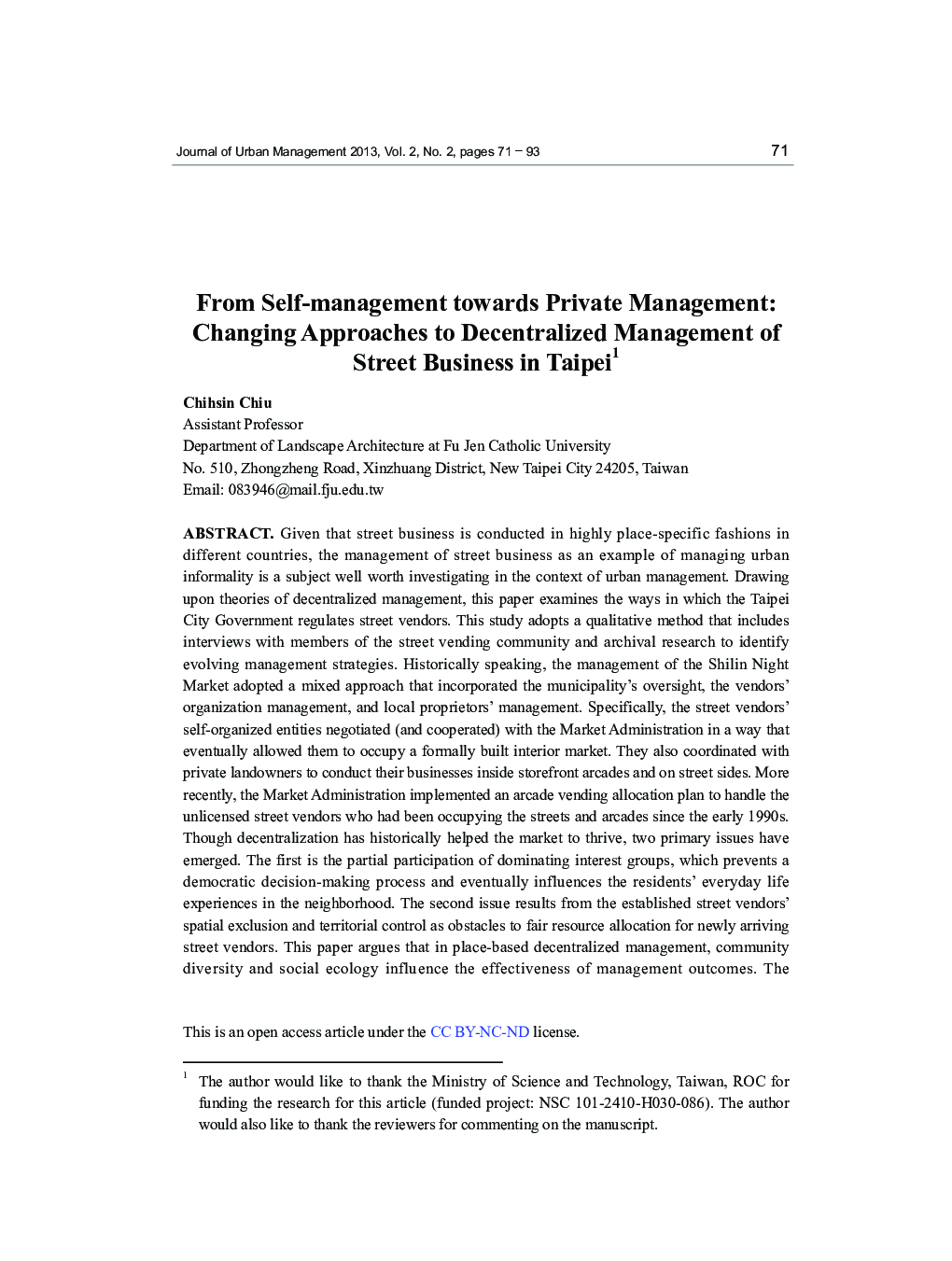| کد مقاله | کد نشریه | سال انتشار | مقاله انگلیسی | نسخه تمام متن |
|---|---|---|---|---|
| 7487432 | 1485462 | 2013 | 23 صفحه PDF | دانلود رایگان |
عنوان انگلیسی مقاله ISI
From Self-management towards private Management: Changing Approaches to Decentralized Management of Street Business in Taipei
ترجمه فارسی عنوان
از خود مدیریت به سوی مدیریت خصوصی: تغییر رویکردهای مدیریت انحصاری خیابان در تایپه
دانلود مقاله + سفارش ترجمه
دانلود مقاله ISI انگلیسی
رایگان برای ایرانیان
کلمات کلیدی
فروشندگان خیابانی، مدیریت غیرمتمرکز، خود مدیریت، مدیریت خصوصی،
ترجمه چکیده
با توجه به این که کسب و کار خیابانی در قالب های بسیار خاص در کشورهای مختلف انجام می شود، مدیریت کسب و کار خیابانی به عنوان مثال برای مدیریت غیر رسمی شهری، موضوعی است که باید در زمینه مدیریت شهری بررسی شود. در این مقاله بر اساس نظریات مدیریت غیرمتمرکز، روش هایی را بررسی می کنیم که در آن دولت شهر تایپه فروشندگان خیابانی را کنترل می کند. این مطالعه یک روش کیفی را که شامل مصاحبه با اعضای انجمن توقیف خیابانی و تحقیقات بایگانی برای شناسایی استراتژی های در حال تغییر مدیریت است، تصویب می کند. از لحاظ تاریخی، مدیریت بازار شبانه شبانه یک رویکرد ترکیبی را که شامل نظارت شهرداری، مدیریت سازمان فروشندگان و مدیریت مالکان محلی بود، تصویب کرد. به طور خاص، واحدهای خود سازمان یافته فروشندگان خیابانی با اداره بازار مذاکره کردند (و با آنها همکاری کردند)، به طوری که در نهایت به آنها اجازه دادند که بازار داخلی را به صورت رسمی ایجاد کنند. آنها همچنین با زمینداران خصوصی همکاری کردند تا کسب و کار خود را در داخل بازیگاه های فروشگاهی و در طرفهای خیابانی انجام دهند. اخیرا، اداره بازار یک برنامه تخصیص وام برای بازی با فروشندگان غیرقانونی خیابانی که از اوایل دهه 1990 اشغال خیابان ها و مسابقات را انجام داده بود، اجرا شد. اگرچه تمرکززدایی از لحاظ تاریخی به رشد بازار کمک کرده است، دو مساله اصلی ظهور کرده اند. اول، مشارکت جزئی گروه های متخاصم غالب است که مانع از روند تصمیم گیری دموکراتیک و در نهایت بر تجارب زندگی روزمره ساکنان محله می شود. موضوع دوم ناشی از محروم سازی فضایی فروشندگان خیابانی و کنترل قلمرو به عنوان موانع تخصیص منابع منصفانه برای فروشندگان تازه وارد در خیابان ها است. در این مقاله استدلال می شود که مدیریت مبتنی بر مکان غیر متمرکز، تنوع اجتماعات و محیط زیست اجتماعی بر اثربخشی نتایج مدیریت تاثیر می گذارد. این نتیجه گیری ها مفاهیم اجتماعی و سیاسی این مطالعه را خلاصه می کند و پیشنهاداتی را برای اجرای سیاست های شهری ارائه می دهد.
موضوعات مرتبط
علوم انسانی و اجتماعی
علوم اجتماعی
جغرافیا، برنامه ریزی و توسعه
چکیده انگلیسی
Given that street business is conducted in highly place-specific fashions in different countries, the management of street business as an example of managing urban informality is a subject well worth investigating in the context of urban management. Drawing upon theories of decentralized management, this paper examines the ways in which the Taipei City Government regulates street vendors. This study adopts a qualitative method that includes interviews with members of the street vending community and archival research to identify evolving management strategies. Historically speaking, the management of the Shilin Night Market adopted a mixed approach that incorporated the municipality's oversight, the vendors' organization management, and local proprietors' management. Specifically, the street vendors' self-organized entities negotiated (and cooperated) with the Market Administration in a way that eventually allowed them to occupy a formally built interior market. They also coordinated with private landowners to conduct their businesses inside storefront arcades and on street sides. More recently, the Market Administration implemented an arcade vending allocation plan to handle the unlicensed street vendors who had been occupying the streets and arcades since the early 1990s. Though decentralization has historically helped the market to thrive, two primary issues have emerged. The first is the partial participation of dominating interest groups, which prevents a democratic decision-making process and eventually influences the residents' everyday life experiences in the neighborhood. The second issue results from the established street vendors' spatial exclusion and territorial control as obstacles to fair resource allocation for newly arriving street vendors. This paper argues that in place-based decentralized management, community diversity and social ecology influence the effectiveness of management outcomes. The conclusions summarize the social and political implications of this study, providing suggestions for urban policy implementation.
ناشر
Database: Elsevier - ScienceDirect (ساینس دایرکت)
Journal: Journal of Urban Management - Volume 2, Issue 2, 2013, Pages 71-93
Journal: Journal of Urban Management - Volume 2, Issue 2, 2013, Pages 71-93
نویسندگان
Chihsin (Assistant Professor),
